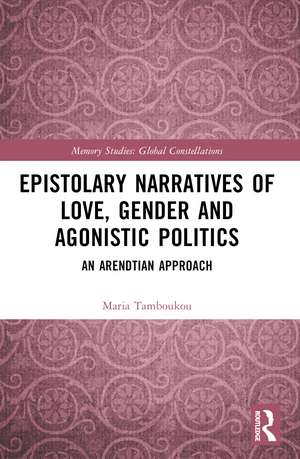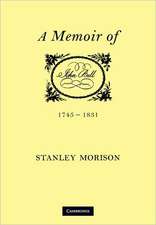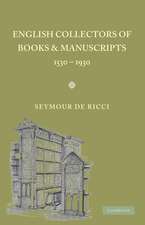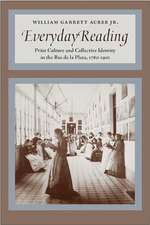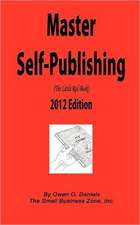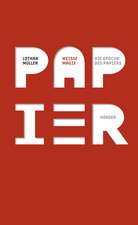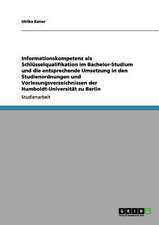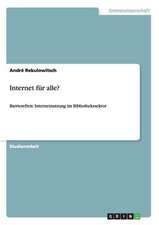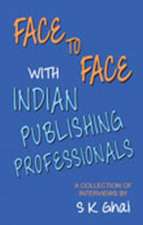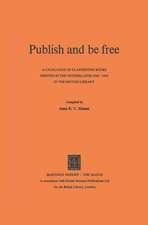Epistolary Narratives of Love, Gender and Agonistic Politics: An Arendtian Approach: Routledge Research in Gender and Society
Autor Maria Tamboukouen Limba Engleză Paperback – 28 noi 2024
| Toate formatele și edițiile | Preț | Express |
|---|---|---|
| Paperback (1) | 310.43 lei 43-57 zile | |
| Taylor & Francis – 28 noi 2024 | 310.43 lei 43-57 zile | |
| Hardback (1) | 1002.50 lei 43-57 zile | |
| Taylor & Francis – 14 iul 2023 | 1002.50 lei 43-57 zile |
Din seria Routledge Research in Gender and Society
- 5%
 Preț: 307.44 lei
Preț: 307.44 lei -
 Preț: 384.85 lei
Preț: 384.85 lei -
 Preț: 148.25 lei
Preț: 148.25 lei -
 Preț: 310.45 lei
Preț: 310.45 lei -
 Preț: 278.93 lei
Preț: 278.93 lei - 9%
 Preț: 1003.31 lei
Preț: 1003.31 lei -
 Preț: 312.34 lei
Preț: 312.34 lei - 8%
 Preț: 389.00 lei
Preț: 389.00 lei -
 Preț: 311.41 lei
Preț: 311.41 lei -
 Preț: 306.80 lei
Preț: 306.80 lei -
 Preț: 287.05 lei
Preț: 287.05 lei -
 Preț: 310.22 lei
Preț: 310.22 lei -
 Preț: 310.41 lei
Preț: 310.41 lei -
 Preț: 310.81 lei
Preț: 310.81 lei -
 Preț: 362.61 lei
Preț: 362.61 lei -
 Preț: 306.99 lei
Preț: 306.99 lei -
 Preț: 287.19 lei
Preț: 287.19 lei - 5%
 Preț: 300.55 lei
Preț: 300.55 lei -
 Preț: 393.65 lei
Preț: 393.65 lei -
 Preț: 483.92 lei
Preț: 483.92 lei - 9%
 Preț: 1106.45 lei
Preț: 1106.45 lei - 26%
 Preț: 821.53 lei
Preț: 821.53 lei -
 Preț: 431.35 lei
Preț: 431.35 lei -
 Preț: 497.20 lei
Preț: 497.20 lei -
 Preț: 488.51 lei
Preț: 488.51 lei - 18%
 Preț: 1057.89 lei
Preț: 1057.89 lei -
 Preț: 355.13 lei
Preț: 355.13 lei - 18%
 Preț: 1005.04 lei
Preț: 1005.04 lei - 18%
 Preț: 1116.74 lei
Preț: 1116.74 lei - 18%
 Preț: 1117.07 lei
Preț: 1117.07 lei - 25%
 Preț: 766.85 lei
Preț: 766.85 lei - 18%
 Preț: 1060.87 lei
Preț: 1060.87 lei - 18%
 Preț: 1057.05 lei
Preț: 1057.05 lei - 18%
 Preț: 1121.81 lei
Preț: 1121.81 lei - 26%
 Preț: 850.91 lei
Preț: 850.91 lei - 18%
 Preț: 1111.16 lei
Preț: 1111.16 lei -
 Preț: 480.62 lei
Preț: 480.62 lei - 18%
 Preț: 1057.09 lei
Preț: 1057.09 lei - 9%
 Preț: 1040.38 lei
Preț: 1040.38 lei - 18%
 Preț: 1112.34 lei
Preț: 1112.34 lei - 15%
 Preț: 699.79 lei
Preț: 699.79 lei - 18%
 Preț: 1163.63 lei
Preț: 1163.63 lei - 18%
 Preț: 1116.02 lei
Preț: 1116.02 lei - 18%
 Preț: 1115.33 lei
Preț: 1115.33 lei
Preț: 310.43 lei
Nou
Puncte Express: 466
Preț estimativ în valută:
59.40€ • 62.18$ • 49.44£
59.40€ • 62.18$ • 49.44£
Carte tipărită la comandă
Livrare economică 31 martie-14 aprilie
Preluare comenzi: 021 569.72.76
Specificații
ISBN-13: 9781032208428
ISBN-10: 1032208422
Pagini: 194
Dimensiuni: 156 x 234 mm
Greutate: 0.36 kg
Ediția:1
Editura: Taylor & Francis
Colecția Routledge
Seria Routledge Research in Gender and Society
Locul publicării:Oxford, United Kingdom
ISBN-10: 1032208422
Pagini: 194
Dimensiuni: 156 x 234 mm
Greutate: 0.36 kg
Ediția:1
Editura: Taylor & Francis
Colecția Routledge
Seria Routledge Research in Gender and Society
Locul publicării:Oxford, United Kingdom
Public țintă
Academic and PostgraduateCuprins
Acknowledgements
Introduction: Rethinking Love through Arendtian Eyes
Chapter 1: Feeling, Reading, Thinking, Writing Love
Chapter 2: Portraits of Moments in BiosHistory Entanglements
Chapter 3: Archival Agonism, Resistibility and Memory Work
Chapter 4: Amor Mundi, or the Reality of Utopian Love
Chapter 5: Epistolary Waves, Politics, Memory and the Force of Love
Chapter 6: Nobody Knows what Love Can Do
Chapter 7: Even Workers Fall in Love: Eros in the Labour Movement
Conclusion: Epistolary Poethics and Agonistic Politics
Index
Introduction: Rethinking Love through Arendtian Eyes
Chapter 1: Feeling, Reading, Thinking, Writing Love
Chapter 2: Portraits of Moments in BiosHistory Entanglements
Chapter 3: Archival Agonism, Resistibility and Memory Work
Chapter 4: Amor Mundi, or the Reality of Utopian Love
Chapter 5: Epistolary Waves, Politics, Memory and the Force of Love
Chapter 6: Nobody Knows what Love Can Do
Chapter 7: Even Workers Fall in Love: Eros in the Labour Movement
Conclusion: Epistolary Poethics and Agonistic Politics
Index
Recenzii
"For those who have been reading Maria Tamboukou’s books work over the years, this book is a denouement of sorts. For those not yet familiar with the pleasures of reading Tamboukou, a distinctive pleasure awaits. Everything comes together via Tambakou’s ‘epistolary poethics’, which put an Arendtian agonism of love into conversation with the private and political writings of four revolutionary women: Désirée Véret-Gay, Rosa Luxemburg, Emma Goldman and Rose Pesotta. Agonism is also in the archive, with Tamboukou’s focus on women whose love letters code private and public. And readers are in the archive with Tamboukou, searching for the shards of revolutionary women’s writing, dispersed into the archives of men made more famous, or reading Emma Goldman’s papers, aware of their pending move under precarious conditions from the reduced shelter of a neo-liberalizing university to a community center. The pain of loss, thrill of discovery, and responsibility of care are braided together as Tamboukou wondrously guides her readers through the epistolarium, its history, and its politics. A must-read for scholars or fans of women's and labour history, feminism, anarchism, or Hannah Arendt."
- Bonnie Honig, Nancy Duke Lewis Professor, Brown University, USA
"The lives of four ‘revolutionary women’ read through Hannah Arendt’s thinking and writing about love: Tamboukou offers us a compelling theoretical narrative on the fascinating entanglements between love and politics. This book convincingly – and joyously - argues that love is a crucial epistemological tool for feminist theory and a vital force for feminist practice."
- Olivia Guaraldo, Professor in Political Philosophy and Director of the Hannah Arendt Center for Political Studies, University of Verona, Italy
"For those who have been reading Maria Tamboukou’s books work over the years, this book is a denouement of sorts. For those not yet familiar with the pleasures of reading Tamboukou, a distinctive pleasure awaits. Everything comes together via Tambakou’s ‘epistolary poethics’, which put an Arendtian agonism of love into conversation with the private and political writings of four revolutionary women: Désirée Véret-Gay, Rosa Luxemburg, Emma Goldman and Rose Pesotta. Agonism is also in the archive, with Tamboukou’s focus on women whose love letters code private and public. And readers are in the archive with Tamboukou, searching for the shards of revolutionary women’s writing, dispersed into the archives of men made more famous, or reading Emma Goldman’s papers, aware of their pending move under precarious conditions from the reduced shelter of a neo-liberalizing university to a community center. The pain of loss, thrill of discovery, and responsibility of care are braided together as Tamboukou wondrously guides her readers through the epistolarium, its history, and its politics. A must-read for scholars or fans of women's and labour history, feminism, anarchism, or Hannah Arendt."
- Bonnie Honig, Nancy Duke Lewis Professor, Brown University, USA
"The lives of four ‘revolutionary women’ read through Hannah Arendt’s thinking and writing about love: Tamboukou offers us a compelling theoretical narrative on the fascinating entanglements between love and politics. This book convincingly – and joyously - argues that love is a crucial epistemological tool for feminist theory and a vital force for feminist practice."
- Olivia Guaraldo, Professor in Political Philosophy and Director of the Hannah Arendt Center for Political Studies, University of Verona, Italy
"In an important contribution to feminist love studies, Tamboukou offers a highly original synthesis of materialist thought on private life. Beginning with a relational concept of the self and building upon the notion of love as a potential source of power for women, in her analysis of love letters by four notable feminist socialists, Tamboukou succeeds in ‘realigning’ emotional attachments, effectively closing the gap between the personal and the political."
-Femmes Auteurs Anglo-AMéricaines [FAAAM], Paris Nanterre University
- Bonnie Honig, Nancy Duke Lewis Professor, Brown University, USA
"The lives of four ‘revolutionary women’ read through Hannah Arendt’s thinking and writing about love: Tamboukou offers us a compelling theoretical narrative on the fascinating entanglements between love and politics. This book convincingly – and joyously - argues that love is a crucial epistemological tool for feminist theory and a vital force for feminist practice."
- Olivia Guaraldo, Professor in Political Philosophy and Director of the Hannah Arendt Center for Political Studies, University of Verona, Italy
"For those who have been reading Maria Tamboukou’s books work over the years, this book is a denouement of sorts. For those not yet familiar with the pleasures of reading Tamboukou, a distinctive pleasure awaits. Everything comes together via Tambakou’s ‘epistolary poethics’, which put an Arendtian agonism of love into conversation with the private and political writings of four revolutionary women: Désirée Véret-Gay, Rosa Luxemburg, Emma Goldman and Rose Pesotta. Agonism is also in the archive, with Tamboukou’s focus on women whose love letters code private and public. And readers are in the archive with Tamboukou, searching for the shards of revolutionary women’s writing, dispersed into the archives of men made more famous, or reading Emma Goldman’s papers, aware of their pending move under precarious conditions from the reduced shelter of a neo-liberalizing university to a community center. The pain of loss, thrill of discovery, and responsibility of care are braided together as Tamboukou wondrously guides her readers through the epistolarium, its history, and its politics. A must-read for scholars or fans of women's and labour history, feminism, anarchism, or Hannah Arendt."
- Bonnie Honig, Nancy Duke Lewis Professor, Brown University, USA
"The lives of four ‘revolutionary women’ read through Hannah Arendt’s thinking and writing about love: Tamboukou offers us a compelling theoretical narrative on the fascinating entanglements between love and politics. This book convincingly – and joyously - argues that love is a crucial epistemological tool for feminist theory and a vital force for feminist practice."
- Olivia Guaraldo, Professor in Political Philosophy and Director of the Hannah Arendt Center for Political Studies, University of Verona, Italy
"In an important contribution to feminist love studies, Tamboukou offers a highly original synthesis of materialist thought on private life. Beginning with a relational concept of the self and building upon the notion of love as a potential source of power for women, in her analysis of love letters by four notable feminist socialists, Tamboukou succeeds in ‘realigning’ emotional attachments, effectively closing the gap between the personal and the political."
-Femmes Auteurs Anglo-AMéricaines [FAAAM], Paris Nanterre University
Notă biografică
Maria Tamboukou is Professor of Feminist Studies at the University of East London, UK, and Leverhulme Major Research Fellow (2022–2025). She is the author of Gendering the Memory of Work and Women, Education and the Self, and the co-author of The Archive Project.
Descriere
Drawing on archival research and exploring the correspondence of revolutionary women and activists in the long durée of the nineteenth and twentieth centuries in Europe and the USA, this book examines the epistolary narratives of women political theorists and activists, following traces of Hannah Arendt’s philosophical approaches to love.
